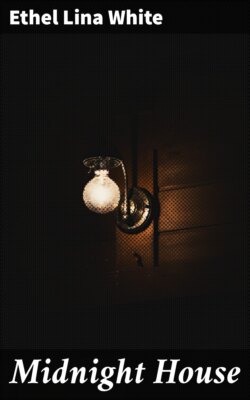Читать книгу Midnight House - Ethel Lina White - Страница 9
На сайте Литреса книга снята с продажи.
—VI—
ОглавлениеTable of Contents
During the afternoon, the scene was visited by another person who was present at the "Last House" of the drama of No. 11. A woman turned into the Crescent and stood in the road, in order to look up at the boarded windows. She was middle-aged, spare and shrivelled. Her faded dark-blue eyes were the only remainder of the beauty of Marion Brown.
She was twenty-eight when she came to live at India Crescent but she looked a girl in her teens. This was partly due to the fact that—owing to its weight—she always wore her hair loose when she was indoors. There was a further factor of arrested development, although her inarticulation was probably the salvation of romance.
After Clement Tygarth's death, Nature adjusted the time-lag cruelly by parching her dew of youth prematurely. The change was unnoticed by Marion, since she was free from vanity. She had given her love with all the force of a simple and ardent nature to the General's son. In her eyes, he was passionate as Byron—beautiful as Shelley—and she cherished her beauty only for his sake.
Otherwise it had proved a complication and a curse, attracting a wave of passion before which she bent like a reed, so that it could not scorch her. Now—when she was left to stand in buses—it was strange to remember that men had actually cried, in the hunger of their unsatisfied longing...
She looked up at No. 10—whose bare windows suggested cleaning to her—and thought of the hours she had paced its rooms as a prisoner. She knew every creaking board, every worn patch on the carpets, every detail in the pictures which covered the staircase wall... It seemed to her that No. 10 must be haunted by an unhappy golden-haired girl in a white wrapper—the ghost of her dead youth.
While she was recalling the dark and muffled house, its door was suddenly flung open. To her surprise, the heavy curtains—which formerly shut off the lobby from the hall—had been removed and the light streamed through the large window at the back, revealing a bright and shining interior.
A very young girl—a silver-blonde—ran down the steps. She wore a suit of black knitwear, relieved by white gloves, scarf and cap. With her were two children—a girl with fat golden curls, in a white fur coat—and a skinny boy in cornflower-blue jodhpurs.
She looked at him with a faint pang, for his white peaked face and large mournful eyes reminded her of Clement... The next second, both children broke loose from the girl.
"Barnaby. Philippa," she called.
She had no control over them and was forced to chase them the length of the Crescent. Marion Brown watched them disappear round the corner. When they had gone, the relief of the interlude was merged in tragic memories.
She had been drawn back to this house by an instinct stronger than her resistance. There was a whisper which warned her that it was not safe to stay. She knew too much of what had happened inside No. 11 just before its long darkness.
While Clement lived, she had not been allowed to cross its threshold, as though it were a sacred spot and she—a defiling cur; but on the last night, the servants had been sent away, so that she was able to slip inside, unseen. While she was hiding, she had been a witness of two fateful interviews.
The General was like an ancient tiger with a broken fang, goaded by the pain to sadistic cruelty. He was old and had lost his son; but he still had power to wreck the promise of the lives of two young men who dared to be alive.
From behind the plaited-grass curtain, Marion Brown watched each of these young men. She saw them enter and she saw them go. She heard all that was said and witnessed what was done... For herself she feared nothing. The General had done his worst to her. Since that terrible minute when she watched the hearse carry her lover to the grave, she had survived only as a creature cut in two.
She was inside that house to take her revenge.
